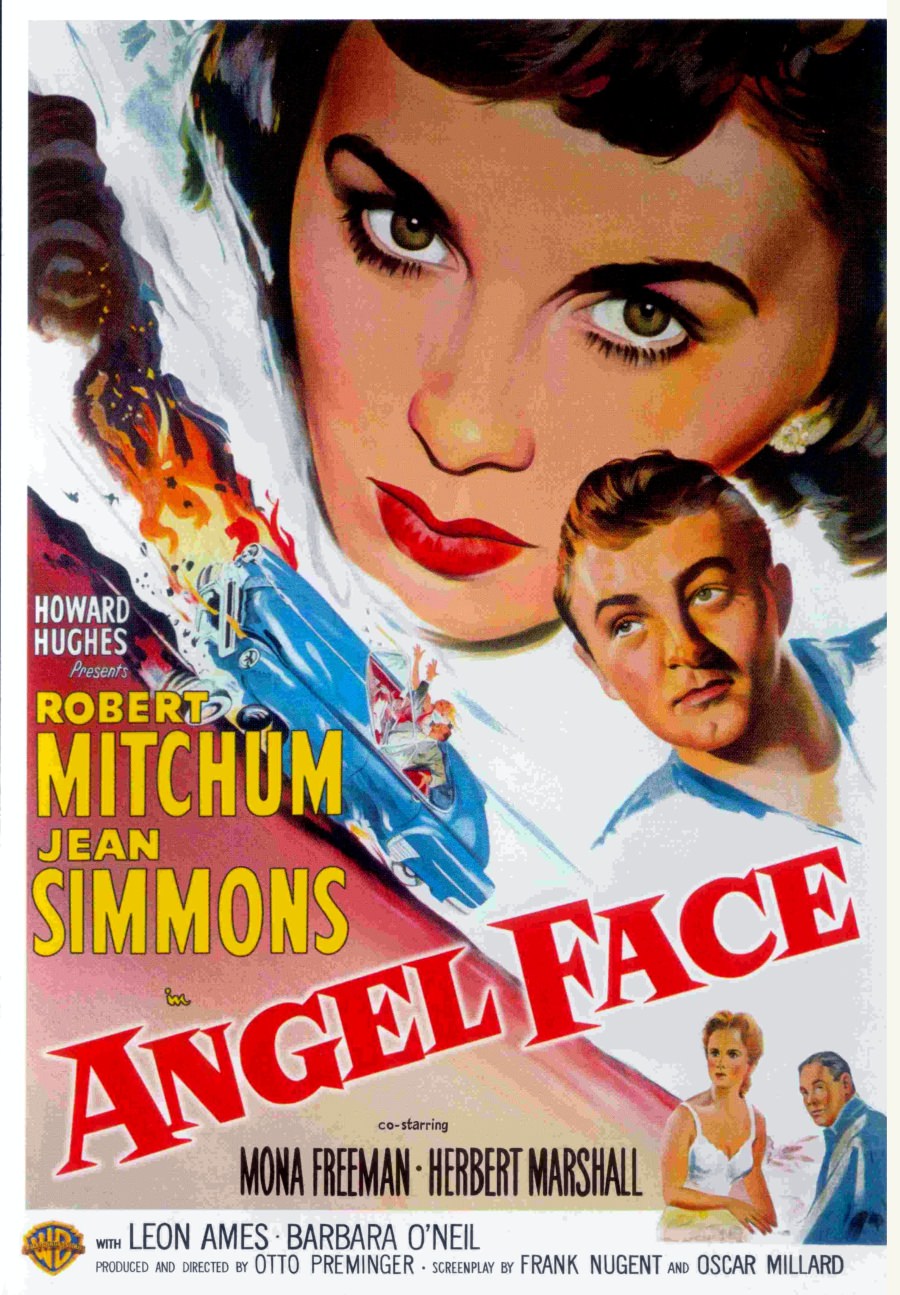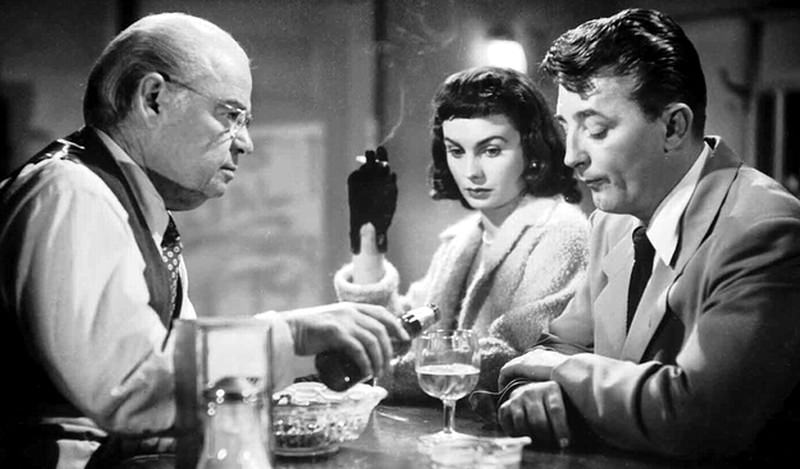Angel Face
Directed by Otto Preminger (1952) ***
As film noir historian Eddie Mueller recounts in his commentary on the film, he first heard of Angel Face when director and critic Jean-Luc Godard listed it as one of his ten favorite American sound films. That such a bizarre and, in many ways, derivative movie would eventually be considered thusly is a bit of a mystery.  Produced by Howard Hughes, it’s one of four noirs Preminger directed in the ’40s and early ’50s (five if you count Daisy Kenyon), and though not, in my opinion, one of the best (Laura and Where the Sidewalk Ends deserve the prizes), it does have a hazy, dreamlike quality that draws the viewer in and doesn’t let go. That mood is heightened by the dreamy-eyed Robert Mitchum, who seems to sleep walk into a web of murder with a nonchalant, “whatever” attitude; it’s no surprise he’s easily duped.
Produced by Howard Hughes, it’s one of four noirs Preminger directed in the ’40s and early ’50s (five if you count Daisy Kenyon), and though not, in my opinion, one of the best (Laura and Where the Sidewalk Ends deserve the prizes), it does have a hazy, dreamlike quality that draws the viewer in and doesn’t let go. That mood is heightened by the dreamy-eyed Robert Mitchum, who seems to sleep walk into a web of murder with a nonchalant, “whatever” attitude; it’s no surprise he’s easily duped.
Mitchum plays Frank, a war veteran ambulance driver with a good job, a great girlfriend, Mary (Mona Freeman), dreams of opening his own car repair garage, and everything to lose. Angel Face opens with Mitchum and a co-worker rushing to a mansion overlooking Los Angeles, where a matriarch, Catherine Tremayne (Barbara O’Neil) has nearly died of gas poisoning — whether accidentally or as a form of suicide it’s not known. The police, who had already arrived, discuss the matter with Catherine’s husband, Charles (Herbert Marshall), who significantly sleeps in a room across the hall; meanwhile, Frank on his way out meets the piano-playing Diane (Jean Simmons), who becomes depressed and hysterical when she hears her stepmother didn’t die.
Diane is soon following Frank, to his work, to a diner, where she, without a word about the subject, convinces him to ditch Mary for the evening and take Diane to dinner and a nightclub. Diane afterwards speaks to her father late at night and it’s clear from their conversation that they share a special bond Catherine is not a part of. Diane, ever-present in Frank’s life now that Mary is spending time with Frank’s co-worker (Kenneth Tobey), offers him a job as chauffeur, a boarding room at the mansion, the possibility of her step-mother funding Frank’s garage — and herself. Frank doesn’t put up much of a fight, allowing Diane to basically take over his life, in exchange for the possibility of married riches. As is clear (to the viewer) in her first scene, though, Diane is a manipulative piece of work and Frank is being set up, in classic noir fashion, to be the ultimate fall guy.
 Angel Face leads up to two scenes of violence so sudden (and the second so nihilistic) that they render the entire film off balance. Laconic, meandering, quiet moments lingered on earlier seem superfluous or betrayed/negated by the end, as if we’re watching a postmodern 1952 Paul Thomas Anderson flick. One may also find Jean Simmons’ black wig unbelievable (it was a necessity after she cut her own hair in protest at Howard Hughes’ continuous attempts to restyle her). Another admittedly subjective flaw I find in the film that renders it not quite believable: Mona Freeman’s Mary seems to me in all regards a much more attractive, level-headed and desirable romantic interest than the gothish and creepy Diane.
Angel Face leads up to two scenes of violence so sudden (and the second so nihilistic) that they render the entire film off balance. Laconic, meandering, quiet moments lingered on earlier seem superfluous or betrayed/negated by the end, as if we’re watching a postmodern 1952 Paul Thomas Anderson flick. One may also find Jean Simmons’ black wig unbelievable (it was a necessity after she cut her own hair in protest at Howard Hughes’ continuous attempts to restyle her). Another admittedly subjective flaw I find in the film that renders it not quite believable: Mona Freeman’s Mary seems to me in all regards a much more attractive, level-headed and desirable romantic interest than the gothish and creepy Diane.
Angel Face was directed in an amazing eighteen days, a consequence of a lawsuit Simmons and husband Stewart Granger had to bring against Howard Hughes (he had purchased her contract in the hopes that she would be his mistress; when Simmons and Granger had other ideas, he stopped giving her movie roles until the lawsuit went to court). You wouldn’t have guessed the short shooting schedule by looking at the film. Preminger directs with his usual careful attention to detail, with concise, fluid pacing, choreography and framing of the shots. To entice Preminger to do the job, Hughes gave him a producer credit and near-complete creative control over the film, including the screenplay (which needed several rewrites). With Angel Face, Preminger was on the way to having the independence he had long desired as a filmmaker, one he would make much use of as soon as his contract with 20th Century Fox was over. Those independent films will be reviewed here on Film Review Central.
The Warner Bros. DVD features Eddie Mueller’s fine and enthusiastic commentary. His observations on film noir are always insightful and his remembrances of discussing the film with Simmons are especially interesting.
—Michael R. Neno, 2022 Feb 20